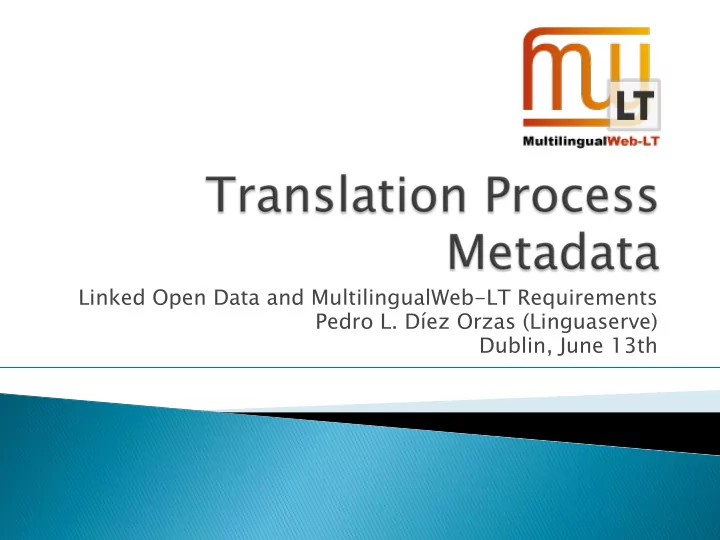

Linked Open Data and MultilingualWeb-LT Requirements Pedro L. Díez Orzas (Linguaserve) Dublin, June 13th
These categories are used primarily for controlling or indicating the state of the content production process: ◦ readin readiness ess: localisation workflows and processes ◦ prog progres ress indicato tor ◦ localisati tionCache: real time localisation system has to cache the content or a part of the content for future
ITS2.0 should be able to indicate: readiness for a particular process: priority expectation of when an a specific process should be completed if an element previously submitted to a process Other ??
• ta targetl tlanguages - value language ID • conte tentT tType - values: MIME version: X.X • pivotL tLang - value language ID • conte tentR tResultS tSource –value: yes / no. Indicates the format if the Localisation chain needs to give back the original • conte tentR tResultT tTarget – value: monolingual, multilingual; indicates if the resulting translation, in the cases of several target languages, should be delivered in several monolingual content files or in a single multilingual content file
Translation Authoring Phase Authoring Connection to Provider General Phase Source QA XLIFF Connector Enrichment Source Terminology Pre-Translation Translation Management Human Machine L10n Multilingual Terminology Metrics/ Annotate w/process & Post-Editing Management Analysis qual data Annotate provenance of Review lang. res. CMS reintegration Publication (CMS) Translation QA CMS Revision Management Post-Translation Process Update Linguistic Publication Resources Costing and Billing
◦ contentQuote - indicates that a quoting or pricing is requested, not to perform the job ◦ contentAlignment - in case the content is to add to a Translation Memory (?) ◦ contentL10N - localize the content ◦ contentI18N - internationalize the content ◦ contentDtp - desktop publishing of content ◦ contentSubtitle - subtitling of content ◦ contentVoiceOver - voice-over of content ◦ sourceRewrite: rewrite the source content (needs contentResultSource - yes) ◦ sourceReview: review the source content (needs contentResultSource - yes) ◦ sourceTranscribe: transcribe the source content (needs contentResultSource - yes) ◦ sourceTransliteration: transliterate the source content (needs contentResultSource - yes) ◦ hTranslate - human translation ◦ mTranslate - machine translation ◦ hTranscreate - human transcreation ◦ posteditQA - human postediting of mTranslate ◦ reviewQA - human review for quality assurance only the target text, without the source text (see UNE 15038 “review”), by an expert for instance ◦ reviseQA - human revision for quality assurance examining the translation and comparing source and target (see UNE 15038 “revision”) ◦ proofQA - human checking of proofs before publishing for quality assurance (see UNE 15038 “proofreading”)
C = Consumes (i.e., uses this data for its function) G = Generates (i.e., produced this data as part of its output) T = Transforms (i.e., process interprets and passes data on in a new form)
ITS 2.0 must be able to convey a simple indication of the proportion of a specified process that has been completed ◦ Data model progress-of-process : a process name progress-indicator : 0-100 progress-units : (sentence|words) default: sentence
Provides an indication of the status of the source and target(s) texts in a system cache for use by real-time translation, TMS, etc. to determine when retranslation is needed. A timestamp can be used to determine when the content was cached. Da Data ta mo model ◦ cach cache - values: yes, no; ◦ sco scope - values: source, target, both ◦ ti timesta tamp - date and time (completed by Real Time Localisation System)
◦ readin readiness ess ◦ prog progres ress indicato tor ◦ localisati tionCache
Recommend
More recommend